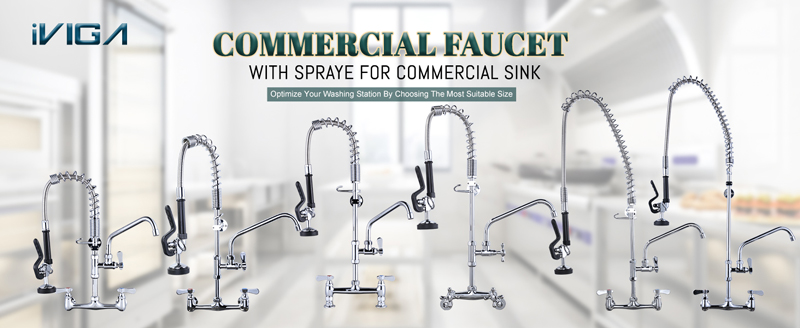
Commercial kitchen sink faucets, like those from iVIGA, endure rigorous daily use, making them susceptible to wear and tear over time. One common issue that arises is a leaking faucet, and addressing this problem promptly is crucial to maintaining the efficiency of your commercial kitchen. In this comprehensive guide, we’ll delve into the step-by-step process of fixing a leaking iVIGA commercial kitchen sink faucet.
How to Fix A Leaking iVIGA Commercial Kitchen Sink Faucet
Step 1: Turn Off Water Supply
Before you start any repair work, it’s essential to turn off the water supply to the faucet. Locate the shut-off valves beneath the sink and turn them clockwise to close off the water flow. This step prevents any water leakage during the repair process.
Step 2: Examine the Faucet
Carefully inspect the leaking faucet to identify the source of the problem. Leaks can originate from various parts, including the handles, spout, or base. Understanding the point of origin will guide your repair efforts.
Step 3: Remove the Handle
For most faucets, the handle is secured with a screw beneath a decorative cap or cover. Use a flathead screwdriver to gently pry off the cap, revealing the screw. Unscrew and remove the handle to access the inner components.
Step 4: Inspect O-Rings and Washers
Once the handle is removed, inspect the O-rings and washers for any signs of damage or wear. These rubber components create a watertight seal, and if they are worn, cracked, or broken, they can lead to leaks. Replace any damaged O-rings or washers with compatible parts.
Step 5: Check the Cartridge
iVIGA commercial faucets often use a cartridge mechanism to control water flow. Remove the cartridge carefully, following the manufacturer’s instructions. Inspect the cartridge for any visible damage, debris, or mineral buildup. Clean the cartridge thoroughly or replace it if necessary.
Step 6: Tighten Loose Connections
Check for loose connections around the faucet, including nuts and bolts securing the spout and handles. Using the appropriate tools, tighten any loose connections to ensure a snug fit. Be cautious not to overtighten, as this may cause damage.
Step 7: Examine the Spout
A leaking spout may be the result of a damaged diverter or worn-out seals. Disassemble the spout, inspect the diverter, and replace it if damaged. Additionally, check and replace any worn-out seals or gaskets contributing to the leak.
Step 8: Repairing a Leaking Base
If the leak seems to be originating from the base of the faucet, it could indicate a faulty seal. Disassemble the faucet and inspect the seal for any signs of wear or damage. Replace the seal with a compatible replacement, ensuring a proper fit.
Step 9: Lubricate Moving Parts
For smooth operation and to prevent future leaks, consider lubricating moving parts like O-rings and the faucet’s handle. Use a silicone-based plumber’s grease to lubricate these components, promoting longevity and reducing friction.
Step 10: Reassemble and Test
Once you have completed the necessary repairs, carefully reassemble the faucet in the reverse order of disassembly. Turn the water supply back on and test the faucet for leaks. Monitor the repaired areas closely for any signs of water seepage.
Conclusion:
In the dynamic environment of a commercial kitchen, a leaking faucet can quickly become a disruptive nuisance. However, armed with the knowledge to troubleshoot and fix the issue, you can save time and resources while maintaining the efficiency of your kitchen operations. The step-by-step guide provided here empowers you to address the common culprits of leaks in iVIGA commercial kitchen sink faucets.
Remember, regular maintenance and prompt repairs are essential for prolonging the lifespan of your faucets and preventing more significant issues down the line. By turning off the water supply, inspecting and replacing damaged components, and lubricating moving parts, you not only fix the immediate problem but also contribute to the overall longevity and functionality of your iVIGA faucet.
In the world of commercial kitchens, where every moment counts, having the skills to address common issues like a leaking faucet is a valuable asset. Keep your kitchen running smoothly, minimize downtime, and ensure a clean and efficient workspace by mastering the art of faucet repair. With this knowledge, you’re not just fixing a leak; you’re optimizing the heart of your commercial kitchen for continued success.
 iVIGA Faucet Online Shop
iVIGA Faucet Online Shop
